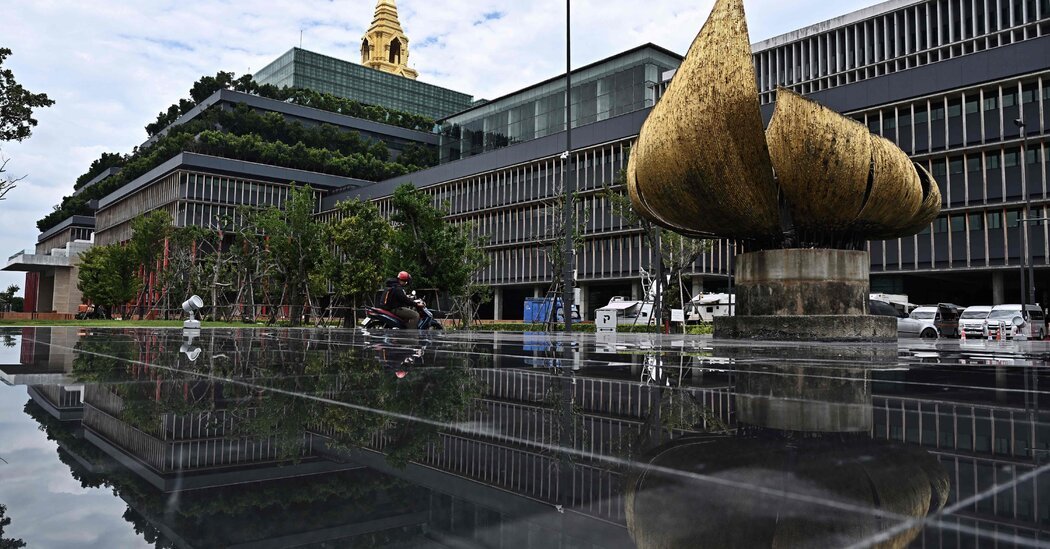To Netiporn Sanesangkhom, the right to dissent and to question Thailand’s powerful monarchy belonged to all Thais. On Tuesday, her crusade to highlight this cause in the face of the country’s strict ban on royal criticism ended in her death.
Ms. Netiporn, also known as Bung, 28, was one of Thailand’s most prominent activists calling for changes to the monarchy. She died after a hunger strike that she began in prison on Jan. 27 to pressure the Thai authorities to put an end to jailing political activists. On Jan. 26, Ms. Netiporn had been sentenced to one month in prison for contempt of court in connection with a protest last year in support of another activist convicted of defaming the monarchy.
For more than two months, Ms. Netiporn refused food, water and all forms of medication. On April 4, she resumed eating and drinking while in the hospital but still rejected electrolytes and vitamins, according to the Department of Corrections. On Tuesday, she went into cardiac arrest and died in the morning.
Ms. Netiporn’s death could pose a public relations challenge for the Thai government, which has been silent about civil society’s demands to weaken the law that makes criticizing the monarchy illegal. The ruling Pheu Thai Party had said during last year’s election that the issue had to be discussed in Parliament, but it backtracked later to say that it would firmly oppose any changes to the law.
On Tuesday, Thailand’s justice minister, Thawee Sodsong, expressed the government’s condolences over Ms. Netiporn’s death and said that an investigation of the cause of her death would be carried out. He conveyed that Prime Minister Srettha Thavisin had ordered that “everything be done forthright.” Mr. Thawee said that he would soon visit Tantawan “Tawan” Tuatulanon, another detained activist on hunger strike.
Ms. Netiporn’s death comes five months before Thailand bids for a seat on the United Nations’ Human Rights Council. The government is also in the midst of negotiations with the European Union for a free-trade agreement that rights activists have sought to tie to democratic commitments.
Thailand has one of the world’s strictest laws against defaming, insulting or threatening the king and other members of the royal family. Known as Article 112, the charge carries a minimum sentence of three years and a maximum sentence of up to 15 years. It is the only law in Thailand that imposes a minimum jail term.
Previously, Thai authorities limited the use of the royal defamation law to people who explicitly criticized the leading members of the monarchy. But after protesters gathered in the streets of Bangkok to question the relevance of the Thai monarchy in 2020, the scope of topics that constituted violations of the royal criticism law expanded to include rubber duck calendars and crop tops because the country’s courts said these references were tantamount to mocking the king.
The authorities have charged at least 270 people with violating Article 112 since 2020, according to Thai Lawyers for Human Rights. The group said the indictment rate for these cases has been 100 percent.
Ms. Netiporn belonged to a group called Thalu Wang, or “Shattering the Palace,” that pushed for the abolition of Article 112. Starting in January 2022, the group conducted opinion polls at various locations in Bangkok asking the public how the Thai monarchy affected people’s lives and whether changes were needed. Ms. Netiporn and many of her fellow activists were slapped with charges including insulting the monarchy and sedition, and were denied bail repeatedly. That prompted Ms. Netiporn and another activist to launch their first hunger strike in 2022.
But members of Thalu Wang started taking more radical steps to draw attention to their cause such as shouting at politicians and overturning tables, alienating many everyday Thai citizens.
“The tactics of Thalu Wang came out of desperation,” said Sunai Phasuk, a senior researcher on Thailand at Human Rights Watch. “They saw that actions taken by the previous wave of political uprisings didn’t get any response. In fact, those who made demands peacefully ended up behind bars. So they chose a more confrontational path.”
Local media outlets reported that in February, Ms. Netiporn had drafted a will to bequeath all her cash assets, bank deposits, her wristwatch, earrings and pets to Thanalop Phalanchai, known as “Yok,” her 15-year-old mentee and the youngest person to be charged under Article 112.
Muktita Suhartono contributed reporting.

